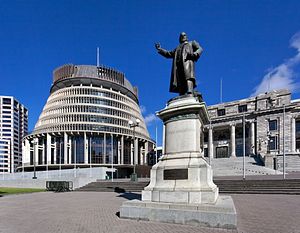Wednesday, a handful of female MPs in New Zealand were ordered to leave the chamber after attempting to discuss their own sexual assaults. The MPs were asking for Prime Minister John Key to apologize for comments made the day before that included the accusation that opposition politicians were “backing the rapists.”
On Tuesday, Key tried to dodge difficult questions about Wellington’s response to the plight of New Zealanders detained by the Australian government. Leader of the opposition Andrew Little had asked the Prime Minister which was correct: whether the New Zealanders detained by Australia were free to go or not. According to the Guardian, as of mid-October, “[e]ighty New Zealand citizens have been deported since December, when the government introduced changes to the migration act allowing for the automatic cancellation of visas.”
A number of New Zealanders are in detention centers–such as the facility on Christmas Island–where they are awaiting deportation. Sarah Hanson-Young, of the Green party, called the detentions “arbitrary,” in October. “The automatic nature of these visa cancellations mean that we don’t just have people who have served prison time for serious crimes… We’ve got to get real here. This includes people with traffic offences, who have been caught shoplifting.”
In his response to Little on Tuesday, Key angrily took aim at Labour and Green parliamentarians who have been outspoken about the situation. Key said “Some of the [detainees] are rapists, some of them are child molesters, and some of them are murderers.”
“These are the people that the Labour party are saying are more important to support than New Zealanders who deserve protecting when they come back here,” he said. More than half the Labour members walked out after Key’s tirade, along with several Green members.
Wednesday, focused shifted entirely from the plight of the detainees to Key’s implication that Labour and Green party members were “backing the rapists.” Several female MPs tried to make statements about their own sexual assaults–some for the first time publicly–as a way of calling out the inappropriate nature of Key’s comments.
As each woman rose to speak, David Carter, the speaker of the house, interrupted them and declared their statements out of order. He accused them of flouting parliamentary procedure in a fairly paternalistic tone:
Poto Williams: “As a victim and survivor of family violence and an advocate for victims of violence, I take personal offense at the comments of the prime minister and ask him to withdraw…”
David Carter: “Order! Order! Now we’re now getting into the stage when there could be a series of these points of orders. … I’ll hear from Catherine Delahunty on the assurance that it’s a fresh point of order and not in any way the type of points of order with…”
Catherine Delahunty: “It’s a fresh point of order. It’s not a campaign, Mr. Speaker.”
David Carter: “Sorry. Catherine Delahunty.”
Catherine Delahunty: “As a victim of sexual assault…”
David Carter: “Order! Order!”
Catherine Delahunty: “I take personal offense and would like to ask for a personal explanation…”
David Carter: “The member will resume her seat.”
In an op-ed published by The Guardian, Metiria Turei, co-leader of the Green Party, writes that “Sexual violence is at epidemic levels in New Zealand and too many people suffer their pain in silence.” She goes on to say that none of the 50 detained New Zealanders has been convicted of rape or murder and sound her disquiet that the prime minister used rape as a political tool:
Challenging our prime minister, as is our job in an open and healthy democracy, should not lead to him accusing victims of sexual violence of backing rapists, and neither should it excuse him from using rape as a political weapon.
Rape is not an abstraction for thousands of New Zealand men, women and children. It is not a political tool.

































